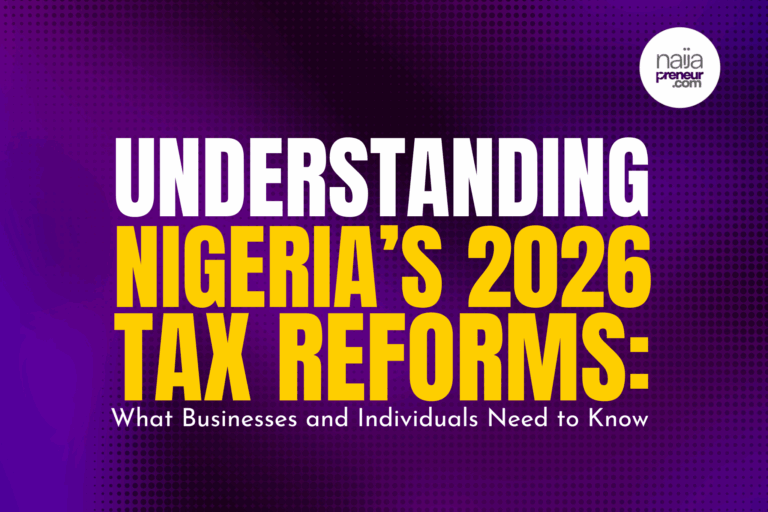The 2026 Tax Reforms have generated plenty of debate, confusion, and even misinformation. For clarity, Naijapreneur.com breaks down the reforms, comparing the old and new tax structures, and explaining what they mean for companies, individuals, and digital earners in Nigeria.
At the heart of the reform are four major Acts working together:
-
Nigeria Tax Act
-
Nigeria Tax Administration Act
-
Nigeria Revenue Service Act
-
Joint Revenue Board (Establishment) Act
Here’s what the new system looks like.
Company Income Tax (CITA)
Before the reform:
-
Companies making ₦25m or less annually paid 0% tax.
-
Companies making between ₦25m – ₦100m paid 20% tax.
-
Companies making above ₦100m paid a flat 30% tax.
After the reform:
-
The “small company” threshold has been raised:
-
Turnover of ₦100m or less AND assets of ₦250m or less = 0% tax.
-
Above ₦100m turnover or ₦250m assets = 30% flat tax on profits.
-
-
The 20% medium band has been scrapped, meaning businesses either qualify as exempt (small) or fall into the 30% bracket.
Personal Income Tax
Before the reform:
-
No clear threshold; low earners were shielded through the Consolidated Relief Allowance (CRA).
-
Example: ₦35k/month earners usually paid nothing; ₦50k/month earners (₦600k yearly) paid some tax via PAYE.
After the reform:
-
A new clear threshold:
-
Earn ₦800k/year or less (about ₦66k/month) = no tax.
-
Above ₦800k = taxed progressively (e.g. ₦800k–₦1.3m = 7%).
-
Capital Gains Tax (CGT)
Before: Flat 10%, excluding shares. Many exploited loopholes by reinvesting profits.
After:
-
15% flat rate on profits, including shares, securities, land, houses, crypto, NFTs.
-
Exemption: If annual profit on shares/securities ≤ ₦5m, no CGT.
-
Other assets taxed at 15% regardless of profit size.
Value Added Tax (VAT)
-
Before: 7.5% on goods and services (with exemptions on essentials). Only businesses earning ₦25m+ annually were VAT-eligible.
-
After: The 7.5% VAT remains, but enforcement is tighter under the new framework.
Stamp Duties → Transaction Levy
Before: ₦50 deduction on bank transfers of ₦10k or more.
After:
-
Now replaced with a flat ₦50 levy.
-
Applies only to transfers of ₦50k and above.
-
Extends to fintechs like Opay and digital banks.
5% Fuel Surcharge
-
Restated in the reform but not yet active.
-
Will only take effect when the Minister of Finance issues a gazette order.
Tax Identification Number (TIN)
Before: Mostly for companies; many Nigerians were outside the tax net.
After:
-
Mandatory for bank accounts (new and existing).
-
Individuals and companies must provide a TIN, bringing more Nigerians into the tax system.
Crypto and Digital Economy
Before: Crypto was untaxed; influencers and digital earners weren’t clearly defined in tax laws.
After:
-
Crypto/NFT sales: 15% capital gains tax.
-
Crypto payments for services: 10% VAT.
-
Exchanges now required to register with Nigeria Revenue Service and deduct tax automatically.
-
Digital creators, influencers, and online earners are expressly defined as taxable persons.
Excise Duties
Before: Light taxes on “sin goods” like alcohol, tobacco, and a ₦10/litre levy on sweetened beverages.
After:
-
Significant hikes: ₦130/litre on sweetened beverages.
-
Steeper rates on cigarettes and alcohol.
The Bigger Picture
Nigeria’s tax masterstroke is simple: drag more people and businesses into the tax net. With only about 19% of Nigerians paying tax as of recent FIRS data, these reforms aim to expand compliance.
Who’s unaffected? Likely only those in the informal sector with yearly incomes below ₦800k or those without bank accounts. But for everyone else—corporate entities, digital earners, investors, and professionals—there’s no escaping compliance.
What Entrepreneurs Should Do
-
Get a TIN if you don’t already have one.
-
Keep clean records of all transactions, especially if you run a business.
-
Plan for tax deductions if you’re in crypto, digital content, or freelancing.
-
Consult your accountant or legal adviser to stay ahead.
Final Word
While the reforms may feel like heavier burdens, they also push Nigeria toward a more structured, transparent, and inclusive tax system. For entrepreneurs, staying informed and compliant is no longer optional—it’s survival.

